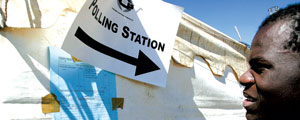
THE past general elections have seen the rise of a new form of communication – graffiti — which is often spray painted on public walls by people wishing to express underlying social and political messages, albeit under the cover of darkness.
BY NUNURAI JENA,OWN CORRESPONDENT
The just-ended July 31 elections was no exception with several buildings, public and private infrastructure left painted with political, economic and social messages mostly from opposition party activists.
Chinhoyi University of Technology arts lecturer Julius Nyamubaya said the emergence of graffiti of late is a clear testimony of lack of freedom of expression in the country and a deficiency of confidence in people’s protection after expressing oneself.
“The reason is that there is limited freedom of expression and lack of confidence in the media to put across all people’s views,” said Nyamubaya
He said graffiti, which is common in Europe, is un-African, but of late Zimbabweans have embraced the art in a big way. Nyamubaya said graffiti, which is also known as “protest art” is a quick art form that that is synonymous with the oppressed.
He, however, said graffiti messages should not be regarded as the general thinking of the whole community. “If you see graffiti it doesn’t mean the whole community is thinking like that. It’s just one person or a small grouping doing it and cannot be regionalised” said Nyamubaya
Political activists Englebert Mashuma said he was forced to resort to graffiti to spread his MDC-T party policies because of shrinking space in the country for them to openly reach out to ordinary people.
- Chamisa under fire over US$120K donation
- Mavhunga puts DeMbare into Chibuku quarterfinals
- Pension funds bet on Cabora Bassa oilfields
- Councils defy govt fire tender directive
Keep Reading
“Because of stringent laws like Posa (Public Order and Security Act) we were left with no option but to resort to graffiti paintings,” said Mashuma. Arts admirer Muchadei Mahove said graffiti messages are genuine and come from the heart.
“ It’s genuine because it’s personal feeling and for someone to pick up a can and spray it really means a lot to that person as it is also risk,” said Mahove.







